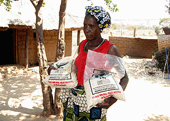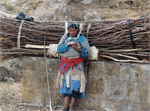Published on Fri, 2014-07-11 12:09
During the last meeting of Heads of State and Government of Brazil, Russia, India, China and South Africa (BRICS Summit), held in Durban, South Africa, in 2013, BRICS’ leaders announced the decision to establish, already in 2014, the BRICS Development Bank. For the next BRICS summit, to take place in the city of Fortaleza, Brazil, on July 14, 15 and 16, they announced signing of a formal agreement on this Bank, but there are still a lot of expectations and doubts about the basis on which it will be constituted. |
Published on Fri, 2014-07-11 11:56
Palestinian Non-Governmental Organizations Network (PNGO) calls on the international community and the Secretary-General of the United Nations Ban Ki-Moon to provide an immediate international protection to the Palestinian people and exert immediate and urgent efforts to stop the Israeli occupation's aggression in the Gaza Strip. PNGO warns that the Israeli occupation totally ignores the international conventions and treaties including the Fourth Geneva Convention by committing horrible crimes against the Palestinian civilians by targeting their houses using war jets, artilleries and gunboats in the light of the Israeli tight siege on the Gaza Strip. |
Published on Wed, 2014-07-09 15:54
The 48 least developed countries (LDCs), described as the poorest of the world’s poor, want to be an integral part of the U.N.’s post-2015 development agenda currently under discussion. An Open-ended Working Group (OWG), which will continue its 13th round of negotiations next week, is expected to come up with a set of new Sustainable Development Goals (SDGs) to replace the eight Millennium Development Goals (MDGs) which reach their deadline by the end of next year. "The neo-liberal policies that have failed LDCs will continue to drive the agenda." -- Demba Dembele |
Published on Tue, 2014-07-08 14:45
With 17 months before the Millennium Development Goals (MDGs) reach their targets by the December 2015 deadline, the United Nations is trumpeting its limited successes – but with guarded optimism. “Global poverty has been halved five years ahead of the 2015 time frame,” says Secretary-General Ban Ki-moon in the latest status report released Monday. "Unfortunately, the trend in the U.N. secretary-general's office and many developed countries is to place hopes in private corporations and 'multi-stakeholder partnerships' that fudge the massive problems caused by many corporations." -- Yoke Ling Chee |
Published on Thu, 2014-07-03 19:35
Last week, human rights advocates had a reason to celebrate, as the United Nations Human Rights Council, meeting in Geneva, decided on June 26, 2014 to establish an open-ended intergovernmental working group whose mandate is to elaborate a legally binding instrument on transnational corporations and other business enterprises with respect to human rights. Not only is the resolution a big achievement in itself. It is also a powerful message of hope to all those in the trenches of facing human rights abuses as a result of the unchecked growth of borderless corporate influence. It proves that people organized across borders, and their political action, still can make a difference. The resolution was achieved against big odds, and even as companies exerted pressure to knock it down, directly and through their influence on important governments. In fact, many governments did not withstand the pressure and voted against, such as the case of United States and many European countries in the Council, while others preferred to abstain. |
SUSCRIBE TO OUR NEWSLETTER






